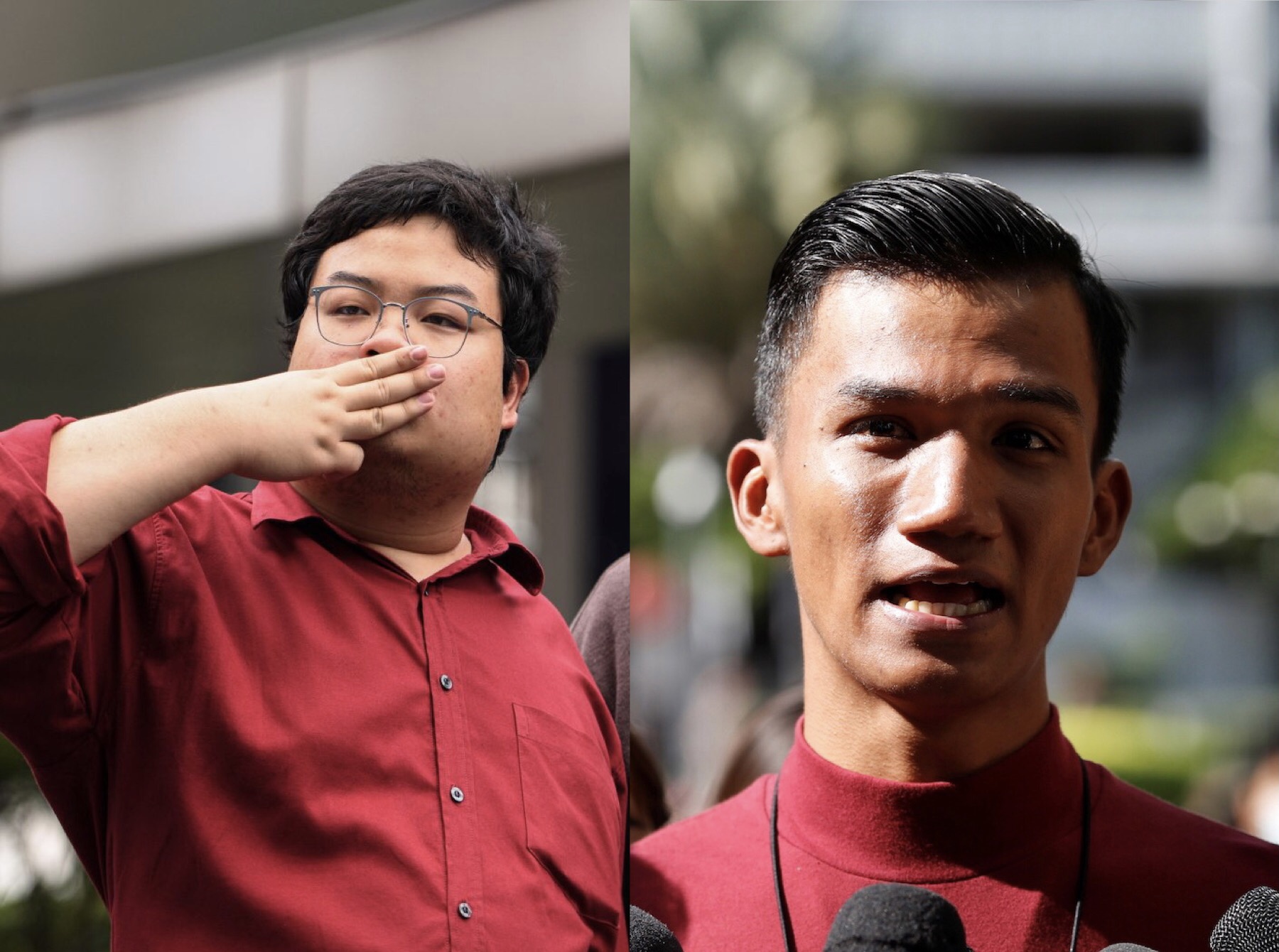© Photos by REUTERS/Chalinee Thirasupa and REUTERS/Soe Zeya Tun
TrialWatch, an initiative of the Clooney Foundation for Justice, is monitoring proceedings against lawyer Arnon Nampa and student-activist Panupong Jadnok in Thailand. They face serious charges, including sedition, following their criticism of the monarchy during pro-democracy protests over the summer.
Although the two are currently on bail, they were held in custody for four days for violating stringent bail conditions that sought to prohibit them from protesting. They remain subject to these bail conditions in related cases, which violates their right to freedom of expression and peaceful assembly in violation of international law. Several other individuals, also facing sedition charges, are likewise subject to these illegal limitations on their rights.
The UN Human Rights Committee has made clear that pre-trial detention is only appropriate “to prevent flight, interference with evidence or the recurrence of crime.” Under Article 9(3) of the International Covenant on Civil and Political Rights, when an individual is released “subject to guarantees,” like bail, the purpose of those guarantees should be to ensure that they “appear for trial.” In this case, authorities have instead used bail as a pressure tactic. In advance of protests on September 19 in which Arnon Nampa, Panupong Jadnok, and other activists have indicated their intent to participate, CFJ calls on Thailand to respect their rights to freedom of expression and peaceful assembly.
Background
Arnon Nampa is an activist and human rights lawyer. He has previously defended those accused of lèse majesté and anti-monarchical activities—including in a deeply flawed trial monitored by TrialWatch last year at which four individuals were convicted of affiliation with the Organization of Thai Federation. Panupong Jadnok is a student leader and pro-democracy activist. The charges against them are predicated on their participation in a large protest organized by student groups on July 18 at Bangkok’s Democracy Monument. According to Human Rights Watch, the protest was peaceful. During the protest, Arnon Nampa made a speech calling for the dissolution of parliament and demanding “state officials to stop threatening citizens, to not be a slave to dictatorship, and to draft a new constitution.” (Arnon Nampa also subsequently participated in a protest on August 3, at which he “accused the palace of taking on increasing powers that undermined democracy,” for which he now faces separate charges.)
As the UN Human Rights Committee recently explained, where a protest is peaceful, even if “certain domestic legal requirements . . . have not been met . . . [that] does not, on its own, place the participants outside the scope of the protection of article 21 [of the ICCPR, which protects the right to peaceful assembly].” Further, the Committee has stated that “all public figures, including those exercising the highest political authority such as heads of state and government, are legitimately subject to criticism and political opposition.” As such, Arnon Nampa’s speech criticizing the government and the monarchy on July 18 constituted protected political expression.
Arnon Nampa and Panupong Jadnok were arrested on August 7 and released on bail the next day. The order releasing them stipulated that they could not “conduct any activities in the same manner as alleged” in their case. On August 9 and August 10, both nevertheless participated in further protests and now face additional charges arising from the August 10 event. On August 13, the police requested that they be re-detained for violation of their bail conditions—asserting in Arnon Nampa’s case that “show[ing] a symbol of resistance against the government as a symbolic expression” was “an act that violates the court’s conditions.” At bail review hearings on September 3, monitored by TrialWatch, the court revoked their bail and the two were immediately re-detained. In Arnon Nampa’s case, the court justified this on the theory that it was necessary “in order to prevent the offender to cause other harms.” In Panupong Jadnok’s case, the court found that he had appeared in public “in order to raise unrest and disaffection amongst the people in a manner likely to cause disturbance in the country, or to cause the people to transgress the laws of the country,” violating his bail. While the court offered that Panupong Jadnok could be released again with a higher surety and subject to the same conditions, he declined bail. On September 7, the police withdrew their request that both men be kept detained because the investigation had progressed sufficiently, and both men were released. However, they remain subject to this unlawful bail condition—that they not take part in protests—based on the other charges against them. This same condition has also been imposed on other pro-democracy activists accused alongside Arnon Nampa and Panupong Jadnok for their participation in protests this summer.
The UN Human Rights Committee has previously made clear that detention as punishment for the exercise of protected rights constitutes arbitrary detention. Further, the Committee has specifically explained that “[p]reventive detention [including pre-trial detention] of targeted individuals, to keep them from participating in assemblies, may constitute arbitrary deprivation of liberty.” That is precisely what has occurred here—and what the continuation in force of the bail conditions suggests could occur again.
The prosecution of Arnon Nampa and Panupong Jadnok also comes at a time when there is an alarming spate of arrests of pro-democracy protesters as well as increasing use of sedition charges to quash dissent. CFJ is committed to shining a light on the ways in which the authorities either directly—or, as here, indirectly—seek to stymie lawful protest activity.
View in Thai (ภาษาไทย).
